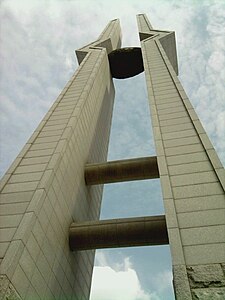Gwangju Democratization Movement
| Gwangju Uprising | |||
|---|---|---|---|
| Part of the Minjung Movement | |||

May 18th Minjung Memorial Tower
|
|||
| Date | May 18–27, 1980 | ||
| Location | Gwangju, South Korea | ||
| Causes | The coup d'état of May Seventeenth, the assassination of Park Chung-hee in 1979, the seizure of power by Chun Doo-hwan, state authoritarianism, and social and political discontent in Jeolla | ||
| Goals | Democratization | ||
| Methods | Protest marches and civil disobedience, later armed uprising | ||
| Result | Several civilian and military casualties | ||
| Parties to the civil conflict | |||
|
|||
| Lead figures | |||
|
|||
| Casualties | |||
|
|||
| Up to 2,000; see Casualties section. | |||
The Gwangju Uprising , alternatively called May 18 Democratic Uprising by UNESCO, and also known as Gwangju Democratization Movement (Hangul: , 광주 민주화 운동; Hanja: 光州民主化運動; RR: Gwangju Minjuhwa Undong), was a popular uprising in the city of Gwangju, South Korea, from May 18 to 27, 1980. Estimates suggest up to 606 people may have died. During this period, Gwangju citizens took up arms (by robbing local armories and police stations) when local Jeonnam University students – who were demonstrating against the Chun Doo-hwan government – were fired upon, killed, and beaten in an unprecedented attack by government troops. The uprising eventually ended in defeat on May 27, 1980. The event is sometimes called 5·18 (May 18; Hangul: 오일팔; Hanja: 五一八; RR: Oilpal), in reference to the date the movement began.
Some critics of the event point to the fact that it occurred before Chun Doo-hwan officially took office, and so contend that it could not really have been a simple student protest against him that started it; however, Chun Doo-hwan had become the default leader of South Korea at that time since coming into power on December 12, 1979, after leading a successful military coup of the previous South Korean government.
During Chun Doo-hwan's presidency, the authorities used to define the incident as a rebellion instigated by Communist sympathizers and rioters. By 1997, a national cemetery and day of commemoration (May 18), along with acts to "compensate, and restore honor" to victims, were established.
In 2011, 1980 Archives for the May 18th Democratic Uprising against Military Regime located in Gwangju city hall were inscribed on the UNESCO Memory of the World Register.
...
Wikipedia
